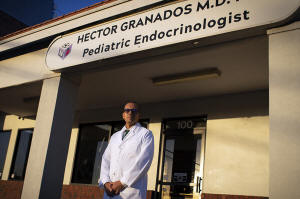Texas says this doctor illegally treated trans youth. He says he
followed the law
 [February 27, 2025]
By JAMIE STENGLE [February 27, 2025]
By JAMIE STENGLE
EL PASO, Texas (AP) — On the Texas border, Dr. Hector Granados treats
children with diabetes at his El Paso clinics and makes hospital rounds
under the shadow of accusations that have thrown his career into
jeopardy: providing care to transgender youth.
In what's believed to be a U.S. first, Texas is suing Granados and two
other physicians over claims that they violated the state's ban on
gender-affirming care for minors, calling the doctors “scofflaws” in
lawsuits filed last fall that threaten to impose steep fines and revoke
their medical licenses. He denies the accusations, and all three doctors
have asked courts to dismiss the cases.
The cases are a pivotal test of intensifying Republican efforts to
prevent such treatments, including President Donald Trump's executive
order that would bar federal support for gender-affirming care for youth
under 19.
Some hospitals have already begun unwinding services for pediatric
patients. But, so far, only Texas is demonstrating what punishing
doctors looks like when bans are allegedly broken.
Granados, in an interview with The Associated Press, said he was
meticulous in halting transgender care before Texas' ban took effect in
2023. He denied that he continued prescribing puberty blockers and
cross-sex hormones to transitioning patients and said he was initially
unclear which patients, who are not named in the lawsuit, he is accused
of wrongfully treating.

The other accused doctors — both in Dallas — are under temporary court
orders not to see patients and only practice medicine in research and
academic settings.
“Looking at the patients was hard because they were kind of disappointed
of what was going on,” Granados said of ending their care. “But it was
something that needed to be followed because it’s the law.”
The lawsuits are believed to be the first time a state has brought
enforcement under laws that ban or restrict gender-affirming care for
minors, which Republicans have enacted in 27 states, including this
month in Kansas over the Democratic governor’s veto. Although those
accused of violating bans face criminal charges in some states, they do
not in Texas.
Nationwide, doctors and hospital executives are reevaluating transgender
health programs that carry a widening risk of litigation and losing
federal funding. For transgender Americans, the climate has narrowed
options for care and deepened fears.
Trump has launched a broad charge against transgender rights quickly in
his second term, signing executive orders that include barring schools
from using federal education dollars to support students who are
socially transitioning. Supporters say restrictions protect vulnerable
children from what they see as a “radical” ideology about gender and
making irreversible medical decisions.
The Texas lawsuits were brought by Republican Attorney General Ken
Paxton, who has previously gone beyond the state's borders to launch
investigations into gender-affirming treatment.
His office did not respond to requests for an interview. At a court
hearing Wednesday involving the Dallas doctors, an attorney in Paxton’s
office declined to comment and referred questions to the agency’s press
office.
“I will enforce the law to the fullest extent to prevent any doctor from
providing these dangerous drugs to kids,” Paxton said in a statement
this month.
A practice in El Paso
Granados is one of two pediatric endocrinologists in El Paso, a desert
city of about 700,000 where mountains rise in the distance.
Granados, 48, is from Ciudad Juarez, the neighboring Mexican city that
sprawls out south of El Paso. He said that after attending medical
school in Mexico he completed additional training in New York and
Connecticut but he wanted to return to what he said is an underserved
region.
He opened a gender clinic at Texas Tech University Health Sciences
Center in El Paso before starting his own practice in 2019. Before the
ban, Granados said, treating transgender youth was just an extension of
his practice that also treats youth with diabetes, growth problems and
early puberty.

[to top of second column]
|

Pediatric endocrinologist Dr. Hector Granados poses for a photo
outside his private practice in El Paso, Texas, Tuesday, Jan. 21,
2025. (AP Photo/Andres Leighton)
 He said he accepted transgender
patients only if they had first received a diagnosis of gender
dysphoria from a mental health provider.
“It was not different from doing everything else
that a pediatric endocrinologist does,” he said. “It was just taking
care of children who required that specific therapy.”
Emiliana Edwards was among them. Now 18, she called Granados an
“amazing” caregiver who carefully explained her gender-affirming
treatment. But at her first appointment after Republican Texas Gov.
Greg Abbott signed the ban in 2023, Edwards said the room felt
different, “like there were wires everywhere.”
“It felt like we couldn’t talk about anything
really, even the most simple stuff,” she said.
Her mother, Lorena Edwards, said Granados put a “cold stop” to her
daughter’s care.
“It was just: ‘I don’t provide that care anymore.’ And it was done,”
she said.
Bringing cases to court
At the heart of Texas' lawsuits against Granados, Dr. May Lau and
Dr. M. Brett Cooper are allegations of prescribing treatment to
transition their patients' sex after the ban took effect.
In one instance, the state accuses Granados of prescribing
testosterone to a 16-year-old, alleging that although the doctor's
records identify the patient as male, the teenager's sex assigned at
birth is female. Granados and Lau are also accused of having
instructed patients to wait until after the ban was in place to fill
prescriptions.
Granados does not dispute that he has continued prescribing puberty
blockers and hormone replacement therapy. He said those treatments
are not for gender transition but for children with endocrine
disorders, which occur when hormone levels are too high or too low.
He said he prescribes testosterone for many reasons, including for
patients whose testicles don’t work or had to be removed because of
cancer. Others have brain tumors, or surgery or radiation to the
brain, that impact puberty. Patients with early onset puberty also
need puberty blockers, he said.
Attorneys for Lau said she has always complied with the law and the
claims have no merit. Attorneys for Cooper did not respond to
requests for comment.

“This is really part of a bigger pattern of extremism within the
state that even other states have shied away from replicating,” said
Sarah Warbelow, vice president of legal for the Human Rights
Campaign.
Transgender adults and youth make up less than 1% of the U.S.
population, according to estimates by the Williams Institute, an
LGBTQ+ research center at the UCLA School of Law.
Going elsewhere for care
Granados' trial has been set for late October; trial dates have not
yet been set yet for Lau and Cooper. While the cases are pending,
Lau and Cooper agreed to practice medicine only in research and
academic settings and not see patients.
Neither Lau or Cooper attended the Wednesday hearing in their cases
by a judge who is set to decide where their trials will be held.
Under Texas' ban, the state medical board is instructed to revoke
the licenses of doctors who are found to have violated the law.
Lorena Edwards said she watched her daughter thrive during her
transition then descend into melancholy as laws targeting
transgender rights gained steam.
Emiliana Edwards has switched to receiving treatment in neighboring
New Mexico — where gender-affirming care is legal — but she said
attacks on the transgender community have taken a toll on her mental
health.
“We’re normal people, too, and we’re just trying to live,” she said.
All contents © copyright 2025 Associated Press. All rights reserved |